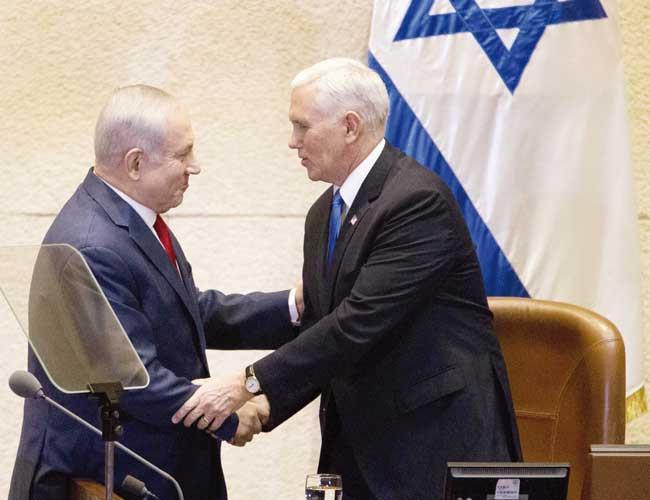
U.S. Vice President Mike Pence said on Jan. 22 that he hoped for “the dawn of a new era” in Israeli-Palestinian peace efforts as he began a visit to Jerusalem despite a Palestinian boycott of his trip.
The visit, initially scheduled for December before being postponed, is the final leg of a trip that has included talks in Egypt and Jordan as well as a stop at a U.S. military facility near the Syrian border.
Controversy back home over a budget dispute that has led to a US government shutdown has trailed Pence, and he sought to blame Democrats for the impasse during a speech to troops at the military facility on Jan. 21.
Arab outrage over U.S. President Donald Trump’s recognition of Jerusalem as Israel’s capital on December 6 had prompted the cancellation of several planned meetings ahead of Pence’s tour.Palestinian president Mahmud Abbas has refused to meet Pence, making his visit a rare one by a high-ranking U.S. official not to include talks with the Palestinians.
Abbas was to meet European Union foreign ministers in Brussels on Monday and was expected to ask them to officially recognize the state of Palestine “as a way to respond” to Trump’s declaration, Palestinian foreign minister Riad al-Malki told AFP.Israel has however enthusiastically welcomed Pence, whose administration has pledged staunch support for the country, with Netanyahu calling him a “dear friend” as they met in Jerusalem.
Pence was given a ceremonial welcome in a tent outside Netanyahu’s office, with an honor guard and military band.In remarks afterwards, Pence called Trump’s Jerusalem declaration “historic” and said the US president believed “we would create an opportunity to move on in good faith negotiations.”Pence said he was “hopeful that we are at the dawn of a new era of renewed discussions to achieve a peaceful resolution to the decades-long conflict that has affected this region.”
Netanyahu again lauded the Jerusalem decision.“I’ve had the privilege over the years of standing here with hundreds of world leaders and [to] welcome them, all of them to Israel’s capital, Jerusalem. This is the first time that I stand here where both leaders can say those three words, ‘Israel’s capital, Jerusalem,’” Netanyahu said.
Pence will address Israel’s parliament later in the day -- a speech that Israeli Arab lawmakers will boycott, calling Pence “dangerous and messianic.”On Jan. 23, the devout Christian will visit Jerusalem’s Western Wall, one of the holiest sites in Judaism.
Trump became the first sitting US president to visit the site when he travelled to Jerusalem in May 2017.The site is located in east Jerusalem, occupied by Israel in the 1967 Six-Day War and later annexed in a move never recognised by the international community.
The city’s status is perhaps the most sensitive in the Israeli-Palestinian conflict, and the Palestinians’ reaction to Trump’s recognition was an illustration of the importance placed upon it.
Beyond refusing to meet Pence, Abbas has said the United States can no longer serve as mediator in Middle East peace talks.
The Palestinians were planning a general strike on Tuesday to protest Trump’s declaration.Unrest since the announcement has left at least 17 Palestinians dead, most of them killed in clashes with Israeli forces. One Israeli has been killed in that time.
Pence, speaking at the military facility, said he hopes “the Palestinian Authority will soon re-engage.”Netanyahu appeared more interested in talking with Pence on other issues, including Iran, Israel’s main enemy.Pence said on Jan. 21 that the United States “will no longer tolerate Iran’s attempts to spread its malign influence or strengthen terrorists across this region.
”In Amman on Jan. 21, Jordan’s King Abdullah II, a key U.S. ally, voiced concern over Trump’s Jerusalem recognition as Pence visited.Pence said the United States respected Jordan’s role as custodian of the city’s holy sites.“The United States of America remains committed, if the parties agree, to a two-state solution,” Pence said.The U.S. move to recognize Jerusalem as Israel’s capital broke with decades of international consensus that the city’s status should be settled as part of a two-state peace deal between Israel and the Palestinians.